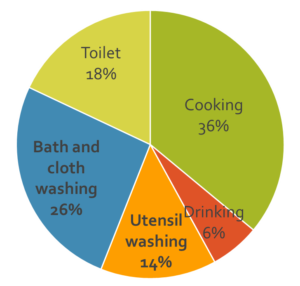Urban households typically can have a connection to a centralized, or reticulated, sewage system, whereas rural households/ farms can manage their wastewater on site.Not all household waste water is equal and some can be reused and one may be surprised how much. Recycled greywater can be safely and efficiently used for outdoor irrigation.
Eshkol helps a typical household to save thousands of gallons of potable water annually, replacing up to 45% of landscape irrigation “green water” for an average single-family home.
Eshkol helps people save a family of four up to 4,000 gallons of water a month depending on usage, significantly reducing their waste and their water costs. Greywater reuse is a key factor in water conservation.
| Greywater Is | Grey Water is not (Blackwater) |
|---|---|
residential water that is not excessively contaminated. Essentially it is untreated household waste water that has not come into contact with sewage. It flows from:
|
Blackwater is water that has been mixed with waste from the toiletwater from toilets, kitchen sinks, dishwashers. Because of the potential for contamination by pathogens and grease, water from kitchens and dishwashers should be separated from greywater and considered as Blackwater. |
Eshkol conducts awareness trainings programs for local households on identifying contaminated water that cannot be reused at all or without off-site treatment. This water is termed “brown water” or “Blackwater.” We understand that each wastewater type must be treated differently and should be used in various ways. Greywater is ideal for garden watering, with the appropriate precautions, such as using low or no sodium and phosphorus products and applying the water below the surface. Also appropriately treated greywater can be reused indoors for toilet flushing and clothes washing, activities that consumes a lot of water.
On the other hand, Blackwater requires biological or chemical treatment and disinfection before reuse, so for single dwellings, treated and disinfected Blackwater can be used only outdoors, and often only for subsurface irrigation.

Figure 1: Water usage in an average household